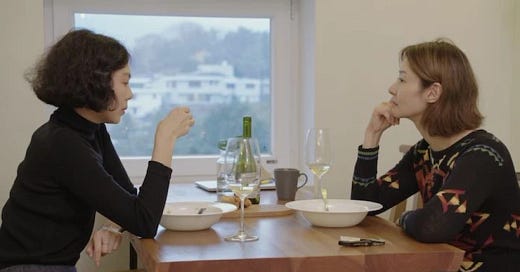There’s no escaping men, but there is always the cinema. This might be one way of summarizing the latest from the prolific Korean Director Hong Sang-soo. A sizable portion of his vast oeuvre is characterized by botched relations between men and women, with the former often impressing themselves upon the latter. After a slew of more somber meditations on personal life (On the Beach at Night Alone, for example) Hong returns with a more comedic effort that reminds of earlier works and finds him settling into middle age. He trades flights of soju for lower a.b.v. makgeolli and white wine, but does not abdicate his sharp sense of auteurship. The Woman Who Ran employs his customary template—variations on theme, a series of recurring narratives, but beneath the lighthearted fancy of this movie lies a more doleful supposition.
On three separate occasions, Gamhee (Kim Min-hee, Hong’s partner and staple to his films) meets with a female friend she hasn’t seen in a while (Seo Young-hwa as a divorcee; Song Seon-mi as a part time dance director; Kim Sae-byuk as an old friend), and unfailingly their low-key girlhang is interrupted each time by a man: a neighbor, a one-night stand, an old professor-lover, that classic Hongian combo. The men are unconnected, the disturbances united only in their fanciful rupturing. In the first visit, an evening of perfectly nice barbeque is capped by a new neighbor who comes knocking to condemn the feeding of stray cats; in the second, a burnt spaghetti dinner concludes with the sound of a man — a poet that Gamhee’s friend slept with once, or twice — banging drunkenly, though not overtly menacingly, on her door. In the third, a run-in with a former flame costs Gamhee personally, though it’s more like an accidental elbow jab and less like a punch in the face.
Conversations are also recycled, a lean into their banality. It’s almost as if the actors were over-enunciating to ensure against misunderstanding or clarify thoughts for feeble minds. That’s of course where the comedy comes in. Every time I watch one of Hong’s movies I get the sense that the actors harden each fricative, consciously accentuating the ordinary dialogue, until it becomes its own coded speech, one that invites you to ponder its significance — if there even is one. This tendency is even more pronounced in The Woman Who Ran.
Gamhee’s husband is away on business, leaving them apart for the first time in their newly married life and affording her time for whatever. The undisputed context is viewed as more casual circumstance than impetus, but the film’s title casts a forlorn shadow on her and the other characters. One wonders if Gamhee could be a fleeing lady, withholding the details of her visit. Perhaps an applicable descriptor of any of the ladies, as each of them evinces some past or present relationship tiff, the fleeing lady is also a blanket statement, one that damns them to a certain fate.





